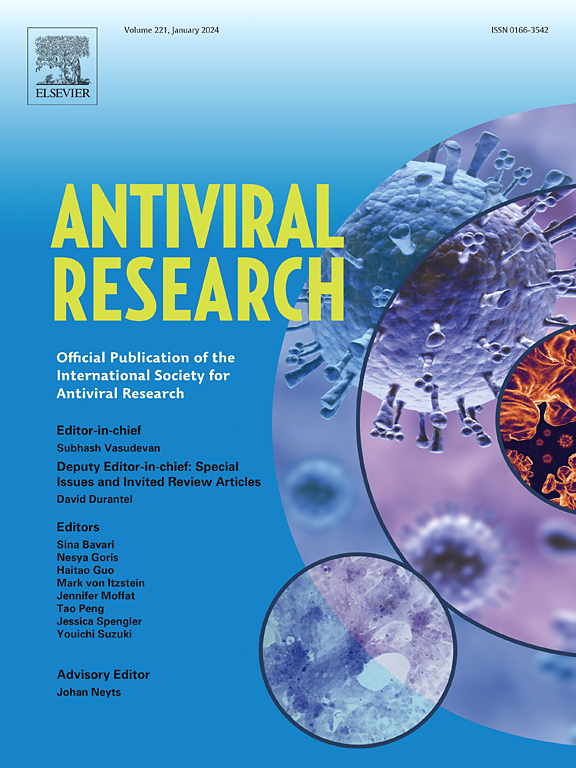Hepato-selective dihydroquinolizinones active against hepatitis A virus in vitro and in vivo
IF 4.5
2区 医学
Q1 PHARMACOLOGY & PHARMACY
引用次数: 0
Abstract
Despite the considerable clinical and economic burden imposed by hepatitis A virus (HAV) infection, both globally and in U.S., there are currently no available antiviral therapies for the treatment of type A hepatitis. Here we describe novel third-generation hepato-selective dihydroquinolizinones (HS-DHQs) with cellular uptake mediated by transport via hepatocyte-specific solute organic anion transporter family members 1B1 and 1B3 (OATP1B1-B3). The lead HS-DHQ compound, HS83128, demonstrates robust inhibition of the host cell TENT4A/B terminal nucleotidyltransferases required for efficient HAV RNA synthesis (IC50 6–25nM), and potent antiviral activity against HAV in cell culture (EC50 0.6 nM). Pharmacokinetic studies in CD-1 mice receiving comparable oral doses of HS83128 and a first-generation dihydroquinolizinone, RG7834, revealed a 5-fold increase in intrahepatic drug concentration and more than 10-fold improvement in liver versus nervous system tissue selectivity. Twice-daily oral administration of HS83128 rapidly arrested viral replication in HAV-infected Ifnar1−/− mice, reducing fecal virus shedding and cytokine markers of hepatic inflammation and reversing virus-induced liver injury. The hepato-selective nature of HS83128 may reduce the risk of neurologic and reproductive track toxicities observed with long-term administration of other dihydroquinolizinones, making it a candidate for the first antiviral therapy of hepatitis A.
体外和体内抗甲型肝炎病毒的肝选择性二氢喹啉酮类药物。
尽管甲型肝炎病毒(HAV)感染给全球和美国带来了相当大的临床和经济负担,但目前还没有可用的抗病毒治疗方法来治疗A型肝炎。在这里,我们描述了新的第三代肝选择性二氢喹啉酮(HS-DHQs),通过肝细胞特异性溶质有机阴离子转运蛋白家族成员1B1和1B3 (OATP1B1-B3)介导的细胞摄取。HS-DHQ先导化合物HS83128显示出对宿主细胞TENT4A/B末端核苷酸转移酶的强大抑制作用(IC50为6-25nM),这是高效合成HAV RNA所必需的,并且在细胞培养中对HAV具有强大的抗病毒活性(EC50为0.6nM)。在CD-1小鼠中接受相当剂量的口服HS83128和第一代二氢喹啉酮RG7834的药代动力学研究显示,肝内药物浓度增加了5倍,肝脏和神经系统组织选择性提高了10倍以上。每日两次口服HS83128可迅速阻止hav感染的Ifnar1-/-小鼠体内的病毒复制,减少粪便病毒脱落和肝脏炎症的细胞因子标志物,逆转病毒诱导的肝损伤。HS83128的肝选择性可能降低长期服用其他二氢喹啉酮类药物所观察到的神经和生殖毒性风险,使其成为甲型肝炎首个抗病毒治疗的候选药物。
本文章由计算机程序翻译,如有差异,请以英文原文为准。
求助全文
约1分钟内获得全文
求助全文
来源期刊

Antiviral research
医学-病毒学
CiteScore
17.10
自引率
3.90%
发文量
157
审稿时长
34 days
期刊介绍:
Antiviral Research is a journal that focuses on various aspects of controlling viral infections in both humans and animals. It is a platform for publishing research reports, short communications, review articles, and commentaries. The journal covers a wide range of topics including antiviral drugs, antibodies, and host-response modifiers. These topics encompass their synthesis, in vitro and in vivo testing, as well as mechanisms of action. Additionally, the journal also publishes studies on the development of new or improved vaccines against viral infections in humans. It delves into assessing the safety of drugs and vaccines, tracking the evolution of drug or vaccine-resistant viruses, and developing effective countermeasures. Another area of interest includes the identification and validation of new drug targets. The journal further explores laboratory animal models of viral diseases, investigates the pathogenesis of viral diseases, and examines the mechanisms by which viruses avoid host immune responses.
 求助内容:
求助内容: 应助结果提醒方式:
应助结果提醒方式:


